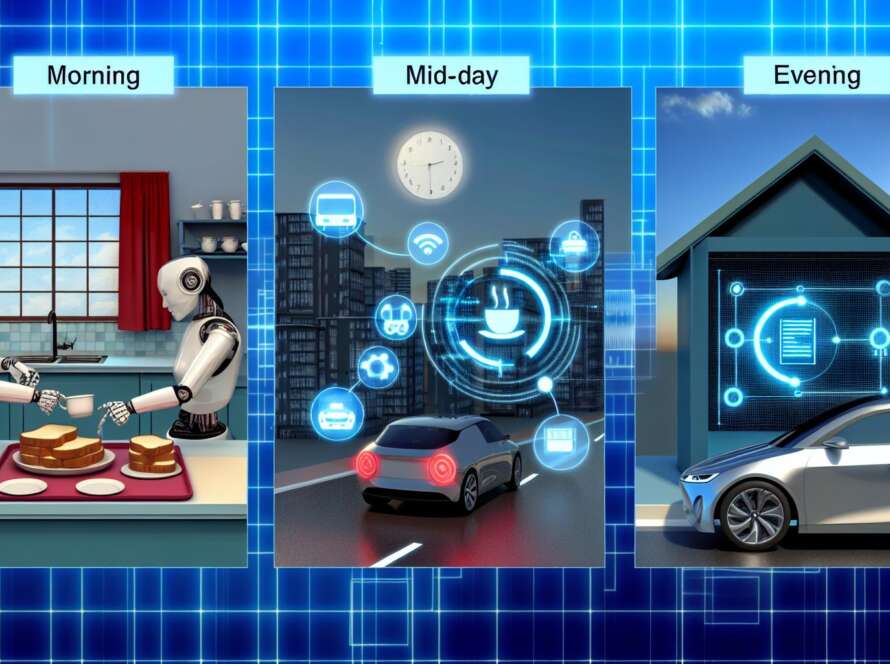In the vibrant universe of Artificial Intelligence, two distinct celestial bodies have been drawing the attention of AI enthusiasts and developers—OpenAI and Gemini. Like two galaxies colliding within the vast realms of technological advancement, their intersection stirs up a compelling conundrum. For your AI-driven explorations and pioneering projects, which star system should you leap towards? In the sparkling, ever-expanding cosmos of AI, each sphere of influence has its unique stellar features and characteristics. As we navigate this cosmic quandary: OpenAI or Gemini, which to choose for your AI projects, let’s engage our warp drives and embark on a journey of discovery.
Table of Contents
- Exploring the Distinctive Features of OpenAI and Gemini
- Delving into Usability: Ease of Integration with Existing Systems
- Cost Considerations and Efficient Budgeting for AI Projects
- Evaluating Performance Metrics: Accuracy, Speed, and More
- Tailoring Your Choice: Which Suits Your Project Scope Best
- Revealing User Experiences and Community Support
- Anticipating Future Trends and Long-term Support from OpenAI and Gemini
- Insights and Conclusions

Exploring the Distinctive Features of OpenAI and Gemini
When deciding between OpenAI and Gemini for managing your AI projects, understanding the unique characteristics each platform brings to the table is crucial. OpenAI, widely recognized for its groundbreaking contributions to machine learning, chiefly through models like GPT (Generative Pre-trained Transformer), shines in scenarios requiring advanced language understanding and generation capabilities. It’s ideal for projects involving natural language processing, chatbot integration, or complex data interpretation tasks.
On the flip side, Gemini offers robust analytics tools that are particularly advantageous for projects demanding rigorous data analysis and management. Gemini excels at tasks that require real-time decision making from large datasets, making it a preferred choice for enterprises involved in sectors like finance or healthcare where data accuracy and speed are paramount.
Below is a concise comparison to aid in selecting the appropriate tool for your specific needs:
| Feature | OpenAI | Gemini |
|---|---|---|
| Core Strength | Natural Language Processing | Data Analytics |
| Best Use Case | Content generation, AI-driven chatbots | Financial forecasting, healthcare analytics |
| User Interface | Intuitive and user-friendly | Highly customizable |
The choice between OpenAI and Gemini ultimately depends on the specific requirements of your project. If your initiative demands cutting-edge language models, OpenAI might be the way to go. However, if your focus is on handling and analyzing vast amounts of data with precision, Gemini could prove more beneficial. Regardless of your choice, both platforms offer substantial capabilities to enhance your AI deployment.
“Everything you need from AI, in one place.
Today’s best AIs in one place, assistants, the most used prompts in the world and the most complete newsletter – within a single subscription.”
You can become our partner and earn money by selling our AI solutions.
Delving into Usability: Ease of Integration with Existing Systems
When choosing between OpenAI and Gemini for AI integration into your existing systems, it is crucial to evaluate how smoothly these platforms can mesh with the tools and protocols your organization already uses. OpenAI is designed with a robust API that generally facilitates seamless integration across a wide range of programming environments. It supports multiple programming languages and comes with comprehensive documentation that guides you through the integration process.
Gemini, on the other hand, shines in environments where custom solutions are necessary. It offers a more flexible architecture for businesses that need a tailored approach to AI integration. This could mean easier adoption for systems that rely heavily on proprietary technologies or uncommon data formats. Below, we compare the ease of integration for both platforms using common system parameters:
| Feature | OpenAI | Gemini |
|---|---|---|
| API Flexibility | High | Moderate |
| Documentation Quality | Excellent | Good |
| Customization Capacity | Low | High |
| Support for Legacy Systems | Moderate | High |
Moreover, consider the ongoing support and development resources that each platform offers. OpenAI provides a stable environment with regular updates and a large community for troubleshooting and support. Gemini’s advantages include dedicated support for unique and complex integration scenarios, which is crucial for companies with specific needs.
Everything you need from AI, in one place. Today’s best AIs in one place, assistants, the most used prompts in the world and the most complete newsletter – within a single subscription.
You can become our partner and earn money by selling our AI solutions.
Cost Considerations and Efficient Budgeting for AI Projects
When considering the financial aspects of integrating AI technologies such as OpenAI or Gemini into your business processes, strategic budgeting emerges as a critical step. Each platform, while offering robust AI capabilities, also presents unique cost structures and pricing models that should be carefully evaluated against the specific needs and scalability requirements of your project.
OpenAI, renowned for its advanced language models like GPT-3, typically offers a usage-based pricing model. This approach allows businesses to pay according to the volume of queries processed, making it an attractive option for projects with fluctuating demand. On the other hand, Gemini might provide a subscription-based model which can be advantageous for entities with consistent usage expectations, ensuring predictable monthly expenses.
Thus, effective budget planning would not only require understanding the raw costs but also predicting usage patterns over the project’s lifecycle. Key considerations include:
- Initial setup fees and recurring expenses
- Cost implications of scaling up or down as per project demand
- Long-term financial impact considering AI model updates and maintenance
Below is a simplified table comparing hypothetical cost structures for a basic AI integration using either OpenAI or Gemini:
| Service | OpenAI | Gemini |
|---|---|---|
| Setup Fee | $1,000 | $500 |
| Monthly Fee | $100 per 1000 requests | $250 flat |
| Scalability Cost (Scaling up) | Variable | Fixed |
Everything you need from AI, in one place. Today’s best AI in one place, assistants, the most used prompts in the world and the most complete newsletter – within a single subscription.
Considering the pros and cons of each platform in the context of their operational costs and overall budget impact can drive more informed decisions. Businesses looking to stay agile and competitive with AI technology need to anticipate these financial considerations as part of their broader strategy for innovation and growth.
You can become our partner and earn money by selling our AI solutions.
Evaluating Performance Metrics: Accuracy, Speed, and More
When evaluating the performance metrics of OpenAI and Gemini for AI projects, several factors come into play. Both platforms have their strengths and weaknesses, and understanding these can help in making an informed decision that best suits your project requirements.
Accuracy: The precision of an AI model in generating relevant and correct responses is crucial. OpenAI, known for models like GPT-3, often shines in tasks requiring deep linguistic and contextual understanding. On the other hand, Gemini might excel in domains where structured data is prevalent, showing high accuracy in pattern recognition and data interpolation tasks.
Speed: Execution speed is another critical metric, especially for applications requiring real-time responses. OpenAI’s infrastructure is robust, offering fast processing times across various applications. Gemini, while generally efficient, can vary in performance based on the complexity and the specific use case.
Additional factors like scalability, ease of integration, and cost also play significant roles. Below is a summarized comparison table:
| Feature | OpenAI | Gemini |
|---|---|---|
| Accuracy | High in linguistic tasks | High in pattern recognition |
| Speed | Fast processing times | Dependent on use case |
| Scalability | Excellent | Good with variations |
| Cost | Higher for advanced models | Cost-effective at scale |
| Integration | Easy with robust APIs | Requires initial setup |
It is essential to assess these metrics in the context of specific AI projects to choose the platform that offers the best alignment with your operational goals and technical needs.
Everything you need from AI, in one place.
Today’s best AIs in one place, assistants, the most used prompts in the world and the most complete newsletter - within a single subscription.
In conclusion, while OpenAI offers extensive coverage and robust performance across a wide range of linguistic and contextual scenarios, Gemini may provide tailored solutions with a focus on structured data and cost efficiency. Careful evaluation of these platforms based on key performance metrics can substantially benefit your decision-making process in deploying advanced AI technologies.
You can become our partner and earn money by selling our AI solutions.
Tailoring Your Choice: Which Suits Your Project Scope Best
When deciding whether OpenAI or Gemini might be the right AI platform for your project, assessing the scope and required features is crucial. Consider the complexity of the tasks you want to automate and the depth of AI interaction your project demands.
Automation and Scalability: OpenAI is renowned for its robust APIs that cater to high-scale, commercial projects, making it a go-to choice for large-scale deployments. It can handle massive datasets and complex machine learning tasks, which benefits projects requiring extensive automation and scalability. On the other hand, Gemini might be more suitable for startups or mid-sized projects where the integration scale is manageable and the data processing needs are moderate.
- **Text Generation and Processing:** OpenAI offers powerful models like GPT-3, which excel in generating human-like text and comprehending complex language patterns.
- **Image and Audio Processing:** Gemini excels in multimedia AI tasks, facilitating advanced image and audio analysis, which can be crucial for projects involving multimedia content.
If your project involves specialized tasks, tailoring the choice based on the AI’s core strengths is key. Consider the following features of each:
| Feature | OpenAI | Gemini |
|---|---|---|
| Language Models | GPT-3, Codex | Limited support |
| Image Recognition | Basic | Advanced |
| Customizability | High | Moderate |
| API Integration | Comprehensive | Standard |
The environment and tech stack compatibility also play a significant role. Both platforms offer different SDKs and API frameworks that may or may not gel well with your existing systems. OpenAI supports a broader range of programming languages and environments, while Gemini offers user-friendly documentation but may fall short in extensive developer tools.
Everything you need from AI, in one place.
Today’s best AIs in one place, assistants, the most used prompts in the world and the most complete newsletter – within a single subscription.
Become a Member
The decision between OpenAI and Gemini essentially boils down to the nature of your project. Weighing their features against your project’s specific needs allows for a tailored choice that maximizes efficiency and efficacy. Consider engaging with each platform’s community and existing users to gain deeper insights into potential fit and performance.
You can become our partner and earn money by selling our AI solutions.
Become an Affiliate
Revealing User Experiences and Community Support
As users dive into the world of artificial intelligence, the support and resources available to them can greatly affect their choice of platform. For those deciding between OpenAI and Gemini, understanding the variety of user experiences and the extent of community support is crucial. Here’s a breakdown of what users have been saying and the type of support you can expect from each.
OpenAI often receives praise for its robust community forums and wide range of resources. Users highlight:
- Active forums: A vibrant and responsive community where questions are quickly addressed.
- Diverse tutorials: Extensive tutorials covering basic to advanced topics.
- Regular updates: Timely and frequent software updates that incorporate user feedback.
Gemini, on the other hand, is noted for its personalized support and dedicated user groups.
- One-on-one support: Offers personal consultations and troubleshooting.
- Exclusive webinars: Provides webinars tailored to different user levels.
- Startup-friendly: Special initiatives to support startups integrating AI.
These features demonstrate the platforms’ commitment to fostering a supportive environment tailored to various user needs.
Beyond user feedback, direct community engagement metrics also provide insight into the platforms’ effectiveness. Here’s a simplified comparative overview:
| Feature | OpenAI | Gemini |
|---|---|---|
| User Forums Activity | High | Moderate |
| Personalized Support | Available | Excellent |
| User Engagement Initiatives | Monthly | Quarterly |
These metrics help possible adopters to understand where they might find more vigorous or personalized community interaction.
Everything you need from AI, in one place.
Today’s best AIs in one place, assistants, the most used prompts in the world and the most complete newsletter – within a single subscription.
Before wrapping up your decision, consider not just the technical capabilities of the AI platforms but also the post-adoption support, which can be pivotal for successful project execution. Navigate through user testimonials, reach out to existing community members, and utilize trial versions if available to see which platform aligns best with your AI aspirations.
You can become our partner and earn money by selling our AI solutions.
Anticipating Future Trends and Long-term Support from OpenAI and Gemini
As we look to the future, understanding the commitment of AI platforms like OpenAI and Gemini towards long-term support and anticipating trends is crucial for any organization planning to invest heavily in AI-driven projects. Both platforms have laid out expansive roadmaps that highlight their intent to stay at the forefront of AI technology.
OpenAI has consistently demonstrated a strong emphasis on research and collaboration. This is visible in their ongoing updates to models like GPT and Dall-E, which suggest that this platform is not just maintaining but actively advancing its capabilities. Anticipating future needs, OpenAI seems focused on:
- Enhancing language model sophistication
- Expanding ethical AI usage frameworks
- Improving user interaction and accessibility
Gemini, on the other hand, takes a slightly different approach by emphasizing industry-specific AI solutions. This strategy suggests that their long-term support is strongly aligned with sectors such as automotive, healthcare, and financial services. Key future focus areas for Gemini include:
- Custom AI solutions for sector-specific problems
- Integration of AI with IoT and big data
- Robust support and scalable infrastructures
| Feature | OpenAI | Gemini |
|---|---|---|
| Customizability | High | Medium |
| Industry Focus | General | Specific Industries |
| Support and Maintenance | Continuous | Targeted |
By analyzing these platforms’ commitments to future advancements and user support, businesses can better decide which platform aligns more closely with their long-term visions and requirements.
Insights and Conclusions
As we reach the end of our exploration into the dynamic world of AI platforms, specifically OpenAI and Gemini, it’s evident that our journey is far from over. The choice between these two titans is not just about selecting a tool; it’s about aligning with a partner that understands and amplifies your project’s unique voice and vision. Whether you are swayed by OpenAI’s robust and versatile framework, or charmed by Gemini’s specialized and user-centric approach, the path you choose will be gleaming with possibilities. Remember, the future of AI is written in the code of today’s decisions. So, ponder, choose wisely, and let your AI dreams set sail towards horizons that promise innovation and transformation.






